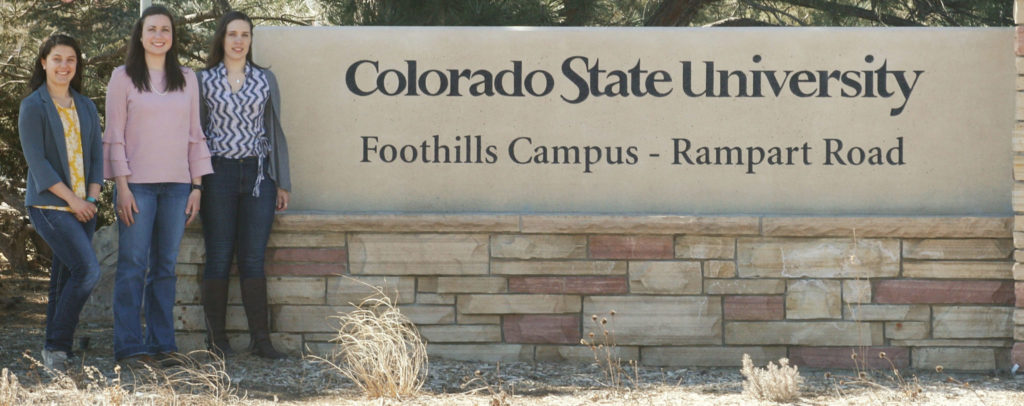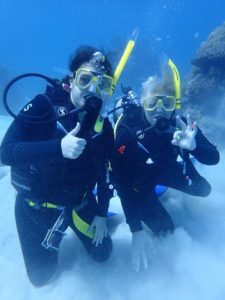
There’s a shortage of scientists going into the field of food and agriculture. The United States Department of Agriculture’s Food and Agricultural Sciences National Needs Graduate and Postgraduate Fellowship Grants Program (NNF) aims to help remedy this by encouraging and training the next generation of policy makers, researchers, and educators going into the field.
Hanah Georges, Carolina Gonzalez-Berrios, and Amelia Tanner, current National Needs Fellows and PhD students in the Department of Biomedical Sciences who are carrying out their research at the Animal Reproduction and Biotechnology Laboratory (ARBL), recently applied for and were each awarded an $8,000 travel grant through the National Institute of Food and Agriculture to travel overseas and collaborate with renowned scientists.
In addition to high-quality scientific training, the NNF program prioritizes providing students with a well-rounded experience including opportunities to learn to write grants and work internationally. “These three National Needs PhD Fellows earned the International Travel Award because they are excellent writers and have outstanding research projects,” said ARBL director and Traubert professor Thomas Hansen.
Hanah Georges
Georges, who grew up on a cattle ranch El Paso, Texas, always wanted to be a veterinarian but fell in love with research while an undergraduate student. She is now working in Hansen’s laboratory studying bovine viral diarrhea virus (BVDV) in cattle and trying to understand how BVDV infection occurs, why it occurs, how it affects fetal immune development, and its impacts on agriculture.

Georges used her travel grant to collaborate with Helle Bielefeldt-Ohmann, a veterinary pathologist and world expert in BVD tissue infection, at the University of Queensland’s Gatton Campus in Australia.
“This experience really helped take my data to the next level and validated that what I am inferring in my research is actually happening,” Georges said. She also took some time to scuba dive the Great Barrier Reef, explore Sydney, try surfing, and visit koalas, wallabies, and kangaroos at a wildlife sanctuary. “This was a really unique experience that not many PhD students get to have.”
Carolina Gonzalez-Berrios
Gonzalez-Berrios, who grew up in Puerto Rico, is also heading to Australia, where she will spend the month of June working with Marina Fortes, an expert in livestock genetics and bioinformatics at the University of Queensland’s Saint Lucia Campus. Gonzalez-Berrios currently works with Hansen and Milt Thomas, a professor and John E. Rouse Chair of Animal Breeding and Genetics in the Department of Animal Sciences, on better understanding early pregnancy loss in dairy cattle, which impacts food supply and the economy. She has loved working with animals since she was a little girl and throughout her undergraduate and graduate education developed a passion for food science and sustainability. Her main career goal is to become a professor and to encourage underrepresented minority groups to pursue studies and careers in agriculture.
Gonzalez-Berrios hopes that her time in Australia will help her to look at data in a new way and to better understand the factors associated with pregnancy loss. “This experience will help strengthen our current theories on what exactly is necessary for and associated with fertility,” she says. She also wants to see the Great Barrier Reef and the Sydney Opera House. “I know this will be a unique and unforgettable experience and I’m looking forward to being in a completely new environment and to learn from different scientists.”
Amelia Tanner
Amelia Tanner grew up in Cedar Park, Texas and developed a passion for food security and international agriculture at a young age through her involvement with 4-H. While conducting undergraduate research, she became interested in how high-risk pregnancies in livestock could impact meat production and went on to develop producer-oriented strategies for managing pregnant beef cows to improve their offspring productivity as a graduate student.
Tanner is doing her PhD work with Russ Anthony, Hill professor of biotechnology in the Department of Biomedical Sciences, where she is investigating how the hormone placental lactogen influences the condition of intrauterine growth restriction in collaboration with the University of Colorado Anschutz Medical Campus. “I’m eager to be working on cutting edge, dual-purpose research that benefits animal agriculture and human medicine at the same time,” Tanner says. She aspires to one day lead a research team focusing on how neonatal physiology adapts to high-risk pregnancy.
Tanner is using her travel award to go to New Zealand in July, where she’ll work with Mark Oliver, a senior research fellow at the University of Auckland’s Liggins Institute to better understand how to manage the consequences of preterm birth. “I am delighted to have the opportunity to work with such a talented group of scientists,” she says. While there, she’ll spend time at a research farm in Rotorua, an area rich in Maori cultural history that she is eager to explore.